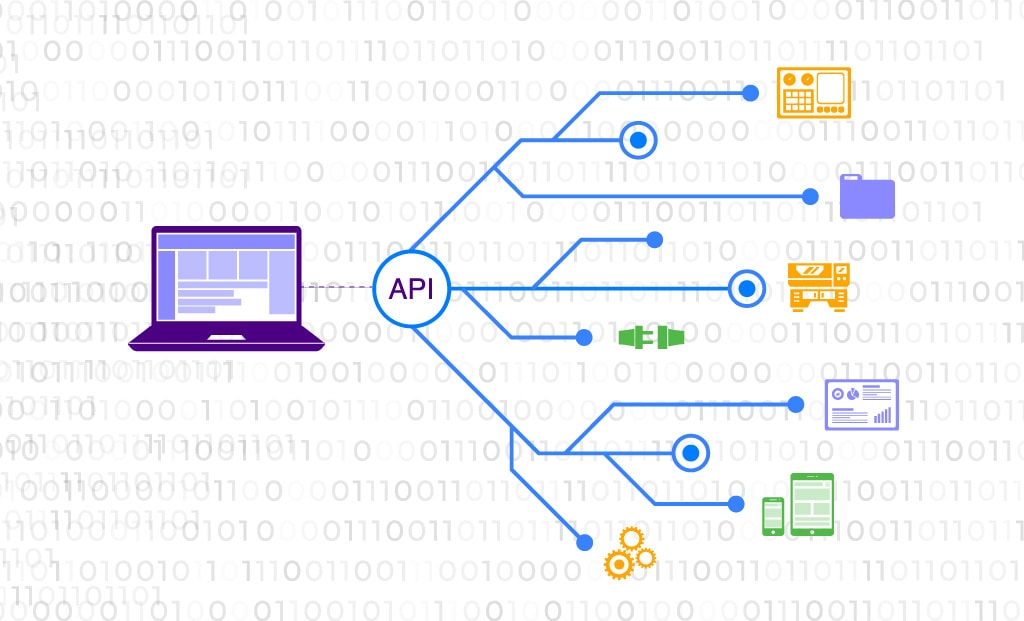An ERP software is a must-have for every manufacturing or distribution enterprise. However, each enterprise is different depending on the nature of their business and the customers they cater to. Therefore, they have niche business needs that can be fulfilled by using a combination of ERP and third-party systems. This means the ERP has to be integrated with multiple systems easily, within less time at a lesser cost.
APIs are one of the means to quickly build a bridge between an ERP and third-party systems. Let’s look at APIs in further detail.
What is API?
APIs stand for Application Programming Interface. It is an intermediate program that allows two applications to interact with each other and share data. APIs are secure as it allows the software to share data that is pre-defined by the API program without revealing the software’s source code.
Some simple examples are,
- Login to a web application using Facebook, Google, Apple, Twitter etc.
- Weather snippets on various platforms such as, Google, Apple etc.
- Booking flights and hotels/resorts on various travel booking platforms.
- Accessing Google Maps on various websites.
- Pay using PayPal
Likewise, there are many applications of API in the world of finance, banking, services, manufacturing, entertainment, distribution, retail, etc.
How does it work?
APIs consist of a coded set of rules that define how a computer, application, or machine will interact with each other seamlessly. Web APIs are often placed between an application and the server, thereby acting as a middle-man.

When a user initiates a request for the application to perform a specific activity, the application will forward the request to the server via the API program to actually perform the task. The task can be retrieving a particular set of data as requested by the user, or to execute a particular task or to redirect to another application, etc.
The application doesn’t access the server’s end-to-end details or the data that it stores or even how it works. It just calls the API to perform a specific task of asking the web server to retrieve the particular data requested by the user. The server retrieves the data, interprets it, performs necessary actions, and sends it to the application. The application interprets and displays it in a format that is suitable for the user to read and consume.
APIs in ERP Software
The possibility of APIs in the world of Enterprise Resource Planning software is limitless. ERP software is designed to automate enterprise workflows and business processes. However, there are some areas that are difficult to automate especially when it is concerning third-party web applications.
With APIs, enterprises can now aim at web and data automation. APIs make ERP software accessible to third-party applications and software systems that otherwise are difficult to integrate with. APIs act as middlemen between the ERP software and third-party applications.
For example, APIs can retrieve a particular data from the ERP software and send it to a mobile/tablet application. APIs can be a data exchange medium between the ERP and the third-party software with data updates happening on both sides. Users can also retrieve data to populate modern dashboards and graphical reports on any computing device.
There are many ERP vendors who still sell legacy ERP software or ERPs that are not in sync with today’s cutting-edge technology. For them, APIs are a god-send as they can help bridge the ERP with other applications that are cloud-based and built on modern technology.
OmegaCube ERP and API
We at OmegaCube, have extensively used APIs to integrate the ERP with various third-party applications for our customers. These customers have varied requirements based on the nature of their business and way of functioning.
E-commerce and Order Management
For a comprehensive e-commerce and order management automation, we have written APIs to integrate the ERP with industry-leading e-commerce platforms such as, Shopify, Magento, etc. When a user places an order on these e-commerce platforms, the APIs push the order data into OmegaCube ERP. As the order progresses, relevant order information such as order updates, inventory data, shipping info, invoice, etc. is pushed back to the e-commerce site. Customers get frequent order updates on the portal & via email till the product is delivered.
Purchase Orders
Similarly, APIs can be used to push purchase order details to supplier portals for quick procurement of goods. From within OmegaCube ERP, users can access the supplier website, and select the items that they want to procure. The selected items are reflected within OmegaCube ERP, which can be used to create and submit a purchase requisition with the supplier.
Mobility
APIs are instrumental in boosting data mobility, especially amongst sales and service personnel who are constantly on the move. Enterprises can create mobile and tablet apps that will talk to APIs. Once the apps are launched, the APIs pull the data from the ERP server and display it on the app.
Customer info, orders, employee info, sales data, order progress, inquiries, etc. will be visible to the sales rep who is on the field. When the rep adds, edits, or deletes data on the mobile app, the API syncs it with the ERP server immediately. Similarly, service personnel can access their service schedule, customer location, service tickets on the app easily.
Using APIs, Google Calendar and Google Maps can be integrated with OmegaCube ERP. This will ensure that sales and service personnel can access the calendar for day-to-day schedules and take the shortest route using Google Maps within OmegaCube ERP.
Credit Card Payments
Using API, we have successfully provided an integrated Credit Card Payment Processing system within our Accounting & Finance Module through the PCI-compliant EBizCharge payment gateway. This enables our customers to accept customer payments directly to their bank account without the need for intermediaries. The API enables a smooth flow of information to and from the payment merchant to OmegaCube ERP. Users can accept payments swiftly from their mobile/tablet devices while on the move.
Inventory Status
For one of our customers, we wrote an API that helps them check inventory availability outside of OmegaCube ERP. Through the API, their users can log in to the portal and check inventory status.
Conclusion
Enterprises depend on their ERP software to achieve workflow automation and manage most of their day-to-day operations without any hiccups. However, as mentioned above, there are some niche requirements that need third-party assistance in the form of integrations, and these can be fulfilled easily with the help of APIs. This helps extend the ERP functionality and extract maximum value out of it.
Contact us to know how a combination of OmegaCube ERP and API services will help your enterprise to achieve comprehensive workflow automation.






One Response
Just exploring your services